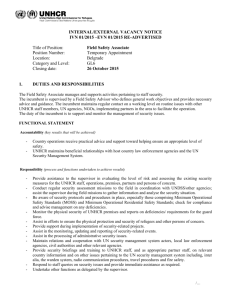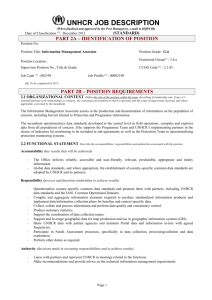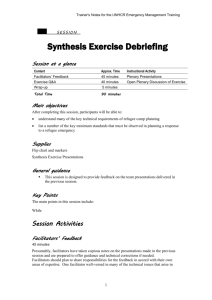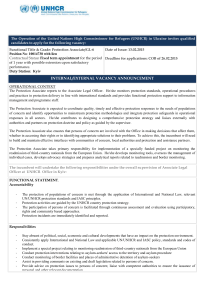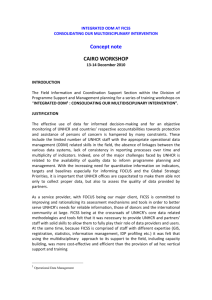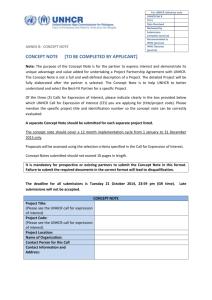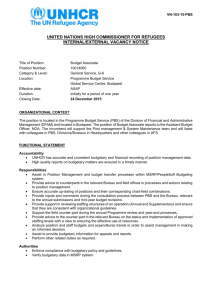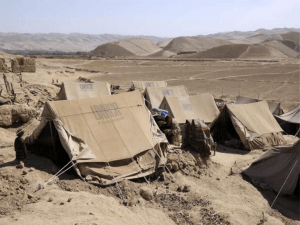3 Frequently Asked Questions-Partner Selection Policy
advertisement
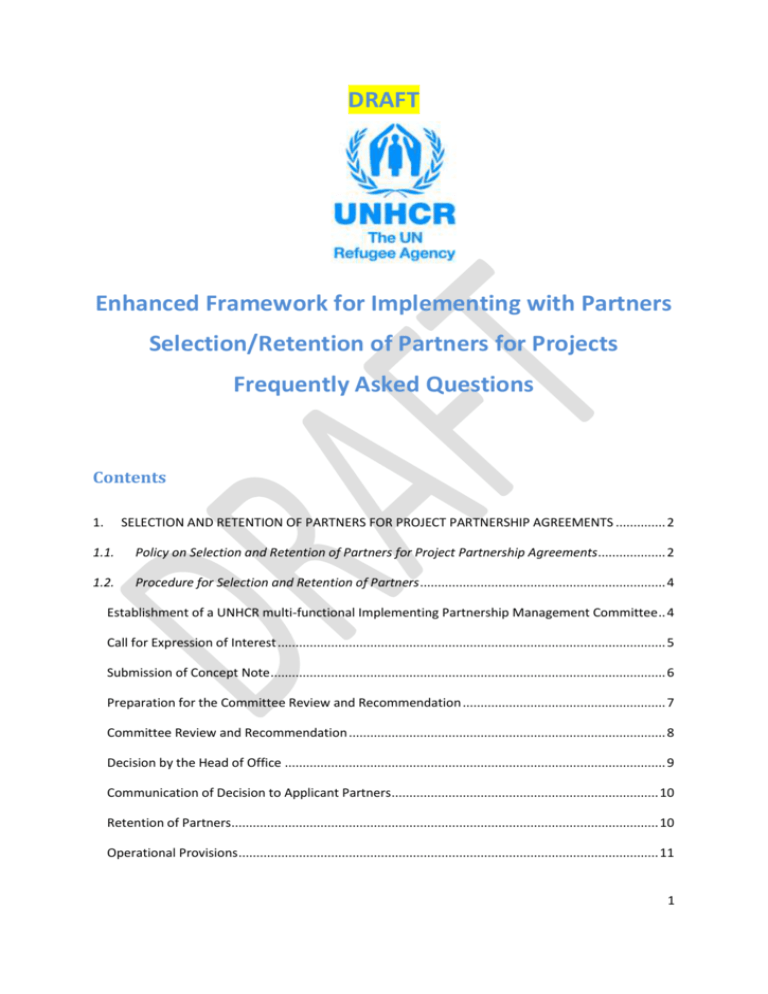
DRAFT Enhanced Framework for Implementing with Partners Selection/Retention of Partners for Projects Frequently Asked Questions Contents 1. SELECTION AND RETENTION OF PARTNERS FOR PROJECT PARTNERSHIP AGREEMENTS .............. 2 1.1. Policy on Selection and Retention of Partners for Project Partnership Agreements................... 2 1.2. Procedure for Selection and Retention of Partners ..................................................................... 4 Establishment of a UNHCR multi-functional Implementing Partnership Management Committee .. 4 Call for Expression of Interest ............................................................................................................. 5 Submission of Concept Note ............................................................................................................... 6 Preparation for the Committee Review and Recommendation ......................................................... 7 Committee Review and Recommendation ......................................................................................... 8 Decision by the Head of Office ........................................................................................................... 9 Communication of Decision to Applicant Partners ........................................................................... 10 Retention of Partners........................................................................................................................ 10 Operational Provisions ...................................................................................................................... 11 1 FINAL DRAFT 1. SELECTION AND RETENTION OF PARTNERS FOR PROJECT PARTNERSHIP AGREEMENTS 1.1. Policy on Selection and Retention of Partners for Project Partnership Agreements 1. Why there has been a need to introduce a new partner selection and retention policy? Over recent years, the selection of partners by UNHCR operations has been criticized by nongovernmental organization for the lack of transparency in selecting partners as well highlighted by auditors for the absence of uniform procedures across the organization. In 2011 with establishment of the Implementing Partnership Management Services, UNHCR took an initiative of establishing and enhancing Implementation Framework for Partnership. Selection of the Partners is an essential component of the new Framework and aims to streamline the selection procedures. The objective of UNHCR’s policy on the selection and retention of partners for Project Partnership Agreements is to ensure UNHCR partners with the most suitable organization in a given operation for the implementation of Projects, in order to provide quality protection and assistance to refugees and other persons of concern. UNHCR Offices, through a multi-functional team approach, are required to undertake adequate due diligence and conduct the process of selection/retention of Implementing Partner(s) in an objective, consistent, transparent and timely manner. 2. Is the selection and retention policy applicable to Project Partnership Agreements with all the partners? This policy applies to all UNHCR Offices undertaking selection/retention of partner where Project implementation requires entering into a Project Partnership Agreement with a partner that is a non-governmental organization, Red Cross and Red Crescent Society or other non-profit entities. The process for the selection of partners will not need to be applied when the partner is a United Nations agency or a governmental institution (designated entity by the authority such as Ministry of Foreign Affairs, Ministry of Interior) that has a unique mandate that cannot be assumed by another organization. 3. Are the offices that do not have implementation with Partners or have Partnership Agreements with values of less than USD 50,000 required to establish IPMCs? Establishment of IPM Committee is not required for operations where there is no implementation with Partners. For operations where the value of the Project Partnership Agreement(s) is less than USD 50,000, the application of the selection policy is at the discretion of the Head of the UNHCR Office. However, the establishment of IPM Committee is advisable to address the need for the selection of partners should the value of signed Agreements go beyond USD 50,000. 2 4. The selection process is mandatory for all projects above USD 50.000. What happens if the same partner implements two or more projects of less than USD 50,000 each, but the cumulative value is above USD 50,000? Application of the selection process for the project(s) with value of less than USD 50,000 is at the discretion of the Office. The application of the selection process is applicable for an aggregate of several projects exceeding USD 50,000 by one partner. 5. How should we handle selection of partners in cases where the Government is signatory to tripartite agreements? The selection process should be done by UNHCR internally. The IMP Committee should review Concept Notes and deliberate and submit its recommendations on applicant partners to the Head of Office. Then, the Head of Office should consult with the Government on the government requirements and political requisites. The Head of Office will factor in all prevailing considerations when concluding UNHCR’s decision. 6. Are all the steps of the selection procedure mandatory? Yes, all the steps of the selection and retention procedure are mandatory. However, there are discretions related to the format of several steps. For example the establishment of the Implementing Partnership Committees is mandatory for all, but the size, composition of the committee is left to the discretion of individual Offices. Another example is the issuance of “Call for Expression of Interest” which is a mandatory step, however each Office can decide on the use of their own templates and forms as well as the choice of appropriate communication media. Duration of each step and of the whole process is at the discretion of the individual Office. However, it must be planned in advance and prospective partners are to be informed about the timeline. 7. How do we manage an immediate/urgent need to sign Project Partnership Agreements when there is no time for any processes? Notwithstanding the importance of the selection of partners and providing opportunities for new partners, UNHCR Office may determine that a complete selection process cannot be undertaken due to operational and security constraints, as this would have an adverse effect on timely addressing the needs of persons of concern (e.g. initial three months of outbreak of emergency situations or security concerns). In such cases the Head of Office at the recommendation of IPMC must seek a waiver from the Implementing Partnership Management Service and inform the respective Regional Office (where such structure exists). The waiver request must be in writing and demonstrate the urgent nature and justification for not undertaking a selection process. IPMS in consultations with the Controller and relevant Bureaus and divisions will decide on the waiver request (within two working days). The waiver may be granted for a maximum of one programming cycle. 8. If at IPMC recommendation the Head of Office decides not to go through selection procedure for a specific Project, what documentation is required to request waiver from HQs? When submitting a waiver request to IMPS, the requesting office should send a memorandum with justification and compelling circumstance for not undertaking a selection process. A copy of IPMC meeting minutes should be filed for later review and audit. 3 9. Can UNHCR staff members propose changes to the procedures? This policy and its application will be subject to monitoring, formal review, (auditors, management reviews, etc.) to ensure its integrity and adapt its applicability for operations. Feedback, experience sharing and proposed changes from UNHCR and Partners can be sent to the IPMS (epartner@unhcr.org), for future improvements of the procedure. 1.2. Procedure for Selection and Retention of Partners Establishment of a UNHCR multi-functional Implementing Partnership Management Committee 10. Can Regional Offices establish a Regional or Sub-Regional Committee instead of a countrybased one? Yes, the Regional Offices can establish Regional or Sub-Regional IPMCs. However, the Head of Office of each country office is fully delegated to establish its own IPMC and take decisions. In the situations when Representatives of countries in the region agree that the Regional Office establishes IPMC, it is advisable to have a representative from the countries the Regional IPMC covers for better sharing information and decision making. It is also permissible that staff from the Regional Offices become members of country IPM Committee. 11. How the IPM Committee is formed and what is the tenure of the committee? The Head of Office will appoint the Committee and draw its members/alternates solely from UNHCR staff with selecting from colleagues from all functional areas with due respect to the principles of UNHCR Age, Gender and Diversity Mainstreaming strategy. The Chairperson (voting member) and Secretary (non-voting member) will also be appointed by the Head of the Office. The size of the committee should be reflective of UNHCR Office size and its resources, but the Committee must consist of at least the chairperson and three full members, the Secretary and their alternatives. In order to support consistency and efficiency, it is recommended that the tenure of the Committee be maintained for all processes relating to the selection/retention of partners for two consecutive UNHCR programme cycles. The memo for establishing the committee must be uploaded into eSafe for future references and audit. 12. Can affiliate workforce personnel be members or alternate members of the Committee? Yes, affiliate workforce (UNVs, UNOPS, etc.) as well as JPOs (Junior Professional Officers) can be part of IPMC in member or alternate capacity, provided the conditions mentioned above (Question 11) are met. 13. What is the exact role of a project control or programme staff designated to the IPMC? Can they be a voting member or an ex-officio? Project Control and Programme staff can be a voting member to the IPMC or can be appointed as a secretary (non-voting member). The decision is left to the discretion of the 4 Head of the Office who established IPMC. It is advisable to include them in the committee as multi-functional team members. 14. Should the Head of Office be allowed to be IPMC chairperson or should the IPMC chairperson be appointed from amongst other UNHCR staff? The Head of the Office cannot be a member or chairperson of IPMC. The Head of the Office is the one who ultimately endorses or disagrees with the recommendation of the IPMC and therefore cannot be part of the Committee’s deliberations in order to foster objective and independent forum to discussions without due influence. 15. Are the Offices required to inform the HQs about the establishment of the Implementing Partnership Management Committee? A memorandum on the establishment and membership of the Implementing Partnership Management Committee is required to be issued and maintained on the Selection Files. The memorandum must also be uploaded to the eSafe folder “Implementing Partnership Committee”, for reference and future reviews. Call for Expression of Interest 16. What’s the purpose of issuing a “Call for Expression of Interest”? The purpose of issuing a “Call for Expression of Interest” is to broaden opportunities for all interested organizations by inviting existing and new partners to express their interest in implementing a specific Project in a given location/operation. The “Call for Expression of Interest” should inform interested partners about UNHCR goals, project objectives and specifications; criteria for selection; deadlines for submission of interest; date of selection decision; and other particularities of the operation and/or Project. The same information will be provided to all existing and potential partners at the same time, in order to ensure fairness and objectivity of the process. 17. If UNHCR has limited choice of partners that can work with refugees in a given country and is aware that only the existing partners have government permission to work in a refugee camp- is UNHCR still required to initiate a “Call for Expression of Interest”? The “Call for Expression of Interest” should still be initiated and requirement for “permission of the government for interested NGOs to work in refugee camps” be announced in the “Call for Expression of Interest”. UNHCR may also assist to negotiate with the government for providing opportunity to NGOs, wherever possible. 18. Can potential partners who are not registered in the country of operation submit Concept Notes following UNHCR’s “Call for Expression of Interest”? Registration of a partner with the host country is not a pre-condition for selection. However, some host countries may require registration of foreign non-governmental organizations (NGOs). Partners are responsible for securing government requirements for registration and operation in a host country. UNHCR may assist the selected partner in the negotiation with the host government, where applicable. 5 19. Can the selection/retention process be launched without issuing “Call for Expression of Interest”? The “Call for Expression of Interest” is mandatory part of the selection process. However the choice of the format for the “Call for Expression of Interest” is at the discretion of the Office. 20. How should the selection criteria strategically be established to ensure transparency and impartiality? The IPMC should convene and decide on the selection criteria that best suits the needs of the operation. The Committee should also agree on the mechanism/methodology as to how the Concepts Notes are to be evaluated based on the agreed selection criteria. It is very important to include the selection criteria in the “Call for Expression of Interest”. 21. Which selection criteria should be given a higher weight and how the evaluation of Concepts Notes is to be done? The selection criteria should be set by the multi-functional IPM Committee team aligning those with the Project and operational requirements. The IPMC is required to establish the relevant and assessable criteria as well as deciding on the rational and manner in which the Concept Notes will be evaluated. There are variety ways of evaluation against set criteria: scoring matrices (quantitative or qualitative) can be used including assigning scoring scales by weights, levels of importance, rating, etc. IPMC should agree on the evaluation methodology and should document the evaluation process for transparency and future reference. 22. Could UNHCR ask a waiver from selection process when UNHCR doesn’t have sufficient number of partners to invite for the “Call for Expressions of Interest”? In case UNHCR has received Concept Notes only from existing partners in response to the issued “Call” limiting the scope of choice, is a waiver from selection process justifiable? The Partner selection/retention policy does not set minimum required number Concept Notes to be received in order to conclude the Partner selection process. If for objective reasons only limited number of prospective partners has submitted Concept Notes, UNHCR will make a selection from the available pool of potential partners. The described scenario does not constitute a case where a waiver from the selection process is required. Submission of Concept Note 23. If a prospective partner is interested in UNHCR’s “Call for Expression of Interest”, how they should inform UNHCR on their intentions to become a Partner? Interested existing or prospective partners may submit a Concept Note in response to the “Call for Expression of Interest”. Prospective partners that have not previously worked with UNHCR and are not yet registered with UNHCR Headquarters will also need to submit the Partner Declaration form contained in Annex A of the Selection Policy Document. 6 24. What should the Concept Note cover and how is it different from fully developed project proposal? The Concept Note is for the partner to express its unique advantage and added value for the Project objectives. The Concept Note is to clearly spell out objectives for undertaking the Project, describe the implementation approach, expected outputs, and demonstrate abilities to meet the selection criteria and project requirements, the unique advantage partner brings to the partnership , and its complementariness with UNHCR's. It is important that the selected partner participates in the design and detailed budgeting of the Project and concluding Project Partnership Agreement. Therefore, the Concept Note should not be a fully developed project proposal and should be concise and contain clear information. 25. Should partners strictly follow the format proposed by UNHCR Office when submitting Concepts Notes? It is at the discretion of the UNHCR Office to determine whether partners use the recommended template in Annex D of the Selection Policy document or if they can use a similar format developed by the UNHCR Office. However, all partners are required to submit Concept Notes to the UNHCR office according to the same standard submission format required by the Office to ensure fair assessment, consistency and objectivity. 26. Can the Government participate in the response to the “Call for Expression of Interest” for projects that are not related to their mandate? The process for the selection of partners does not need to be applied when the partner is a governmental institution that has a unique mandate that cannot be assumed by another organization (such as the ministry of interior of a host country), as determined by the Head of Office upon recommendation of the Committee. 27. If UNHCR has received a Concept Note from a partner as latter’s initiative, could the office accept the Concept Note and conclude partnership if the proposed project is in line with UNHCR operations Plan? Partners can bring forward initiatives by submitting a Concept Note to the relevant UNHCR Office. In cases where the initiative is within the Operation Plan, the UNHCR Office is required to issue a “Call for Expression of Interest” to ensure fair selection among all interested partners. However, the same opportunity should be offered to all interested partners for fair and objective assessment and inclusion. Preparation for the Committee Review and Recommendation 28. How it is ensured that all the submissions from the different prospective partners are considered? All the submissions from the prospective partners will be compiled and submitted by the IPMC Secretary to the members of IPMC to carry out different assessments. Secretary will also verify if the applicant organization is not listed in any of the sanctions lists established by the UN Security Council and depending on operational context in different operations might conduct other verifications (such as checking previous performance, audit reports, reference checks, etc.). 7 29. The Secretary’s function to the IPMC is important and responsible job. Is there any recognition or compensation provided for undertaking the additional responsibilities? It is the discretion of the Head of Office to task staff and afford compensation provided for acting as Secretary to IPMC. However undertaking of additional responsibilities can be acknowledged in the staff member’s annual performance appraisal process. 30. The secretary to the IPMC is required to have good knowledge of project implementation/management and clear understanding of his/her responsibilities (preparation of “Call for Expression of Interest”, Selection Decision template, drafting the letter on selection decision addressed to partners, etc. ). If the Secretary is from different unit than Programme, is there any mechanism to assist the Secretary to carry out her/his responsibilities? It is recommended that when appointing a secretary to the Committee these requirements are kept in mind. Secretary’s role is to assist ensuring that all the documents are received on time, members of the Committee provided with relevant documents for assessments, files are maintained in order and minutes are prepared, etc. Full knowledge of project management is not required to fulfill the above responsibilities (for example the “Call of Expression of Interest” should be prepared by Programme Officer and not Secretary). Committee Review and Recommendation 31. How the submitted Concept Notes will be studied and analyzed? The IPMC will examine and evaluate all the Concept Notes and other requested information submitted by all applicant organizations, the results of technical and other assessments as well as related documents compiled by the Secretary. Then the Concepts Notes will be reviewed and analyzed taking into account the criteria and Project specifications that were outlined in the “Call for Expression of Interest”. The Committee will consider all factors to identify the partner that most substantially conforms to the requirements and criteria outlined in the “Call”. The Secretary will collect and tabulate all the applications. 32. Can the review process include a physical visit to the prospective partner’s office and interview with their staff? If it deems necessary to undertake such assessment, visit to the partner’s office is possible to help the selection process. 33. Will the Committee decision on the selection of the Partner be final? The Committee will not make a final decision on the selection of a Partner. The Committee’s responsibility is solely to conduct assessment and make a recommendation to the Head of Office for the final decision. 34. Should the Committee’s deliberations be documented for possible reference? The Committee’s deliberations and recommendation(s) along with all justifications will be documented by the Secretary in the meeting minutes. The meeting minutes must contain a summary of the discussion, the decision taken and the reasons for that decision. Any 8 Committee member has the right to request the Secretary that his/her view be duly reflected in the minutes. Meeting minutes must be shared within three working days of the Committee meeting with the IPMC members and, upon their adoption/signature, be presented to the Head of Office and regional office (where such structure exists). 35. Can the IPMC meeting be conducted through phone or conference call? IPMC meetings can take place in‐person, by telephone or electronic means, provided that the rules and confidentialities are maintained. 36. Should the recommendations of the IPMC be reached through consensus or by majority of votes? The IPMC should reach its recommendations based on voting. The majority vote will determine the IPMC’s recommendation. In case a majority vote cannot be reached, the decision will be referred to the Head of Office. The Committee can only make recommendations when there is quorum, requiring the presence of the Chairperson (or alternate) and two‐third of the members (or alternates). Decision by the Head of Office 37. The final decision on the selection/retention process rests with the Head of Office. If the Committee does not agree with the Head of the Office final decision, what next steps the IPMC should undertake? The Committee can only make recommendation on the selection/retention of partners. The Head of Office holds the ultimate responsibility to the High Commissioner for the management of the Operation in a country. The final decision, accountability, responsibility and authority for selection/retention of partners remain with the Head of Office. However, it is required from the Head of Office to exercise adequate due diligence, objectivity and fairness. The Head of Office is required to fully document the rationale for approval or rejection of the Committee’s recommendation. The decisions of the Head Office are subject to oversight review and audit. 38. Does the IPMC have to redo the selection process in case of rejection of its recommendation by the Head of the Office? Should the Head of Office disagree with the Committee’s recommendation, the options available are to either select the next Best-fit Partner or to initiate a new selection cycle, as determined by the Committee. 39. Can the office sign a Project Partnership Agreement following the final decision by the Head of Office? The Head of Office will grant that the selected partner is engaged in Project implementation for two consecutive years of the UNHCR programme cycle, provided that the partner has demonstrated good performance, the operation continues, and funds are available for 9 Project implementation for the second year. Prior to the signing of Project Partnership Agreement the Office needs to discuss and negotiate with Partner the details of the Project. Communication of Decision to Applicant Partners 40. How will the outcomes of the selection process be announced to the applicant organizations? In order to demonstrate transparency, the Head of Office will inform the applicant organizations, in writing, of the outcome of the selection/retention process within three working days of the date of the decision. 41. Can an e-mail be adequate in providing feedback to the applicant organizations? An appropriate communication medium (i.e. email, web, letter, etc.) should be used taking into account protection sensitivities, security constraints and the operational environment when communicating the results of the selection process to applicant organizations. 42. Can applicant organizations that were not selected request clarifications on the selection decision from UNHCR and if yes should UNHCR respond? Should an applicant organization request clarification on the selection decision, the Head of Office is required to provide a response explaining the transparency and integrity of the selection/retention process. However, the UNHCR Office may not be in position to disclose the rationale of the decision due to operational sensitivities (e.g. confidentiality related to protection of persons of concern, security). The feedback must be provided within 15 working days of the request. Applicant organizations that are not satisfied with the feedback provided by the UNHCR Office in the field may escalate their concerns to UNHCR’s Implementing Partnership Management Service (IPMS). The IMPS will then assess and relay to the appropriate senior management for follow up. Retention of Partners 43. Is retention of a partner for the second year automatic as UNHCR has granted a partner engagement in project implementation for two consecutive years? While the selection of partner is for a period of two UNHCR programme cycles, prior to entering into the second year Project Partnership Agreement a desk review by the Programme Unit (or other designated unit) is to be conducted to ensure that the operation requires retention and the partner performance is adequate. If the desk review determines that the partner should not be retained, the matter shall be referred to the Committee. Upon recommendation of the Committee, the Head of Office may decide not to retain the partner. Such decision will be communicated in writing to the partner, in advance. 10 44. How is the retention decision beyond two operational consecutive years made? After two UNHCR programme cycles, the Committee is required to determine whether it is in the best interest of the operation to further retain the selected partner for an additional two programme cycles. The review is to be conducted and documented taking into consideration performance of the partner and quality of delivery of desired results; whether a change of partner may negatively impact on resources, continuity and/or effective response to the persons of concern; UNHCR’s contribution in the capacity development of the partner may be lost or not yield its desired outcome in case of change of partner; contribution of partner (in cash or in-kind); willingness of partner to continue with Project implementation; and availability and interest of alternative partners. 45. A partner can be retained maximum for four years following selection by the Committee subject to evaluation of their performance at the end of each year and operational need. After four years, does the Committee need to issue a “Call for Expression of Interest” to this partner who has been already engaged by UNHCR in previous 4 years? Does the partner still need to submit Concept Note? Offices are required to ensure that for each Project a complete and comprehensive selection process is undertaken no less frequently than every four years. UNHCR Offices should consider all partners, not to disregard (or include) simply because they are new or existing partner. Wider publicity of a “Call for Expression of Interest” and solicitation should be undertaken so to have a broader choice among existing and new partners. All the partners responding to the “Call for Expression of Interest” should submit Concept Notes. 46. For exceptional and valid reasons, the NGO was engaged by UNHCR to become a partner despite absence of the selection process. Would the NGO benefit from 4-years qualifying period? It is possible that a NGO was selected as a partner without going through the Partner Selection Process (for example following granting of a waiver from the process). However, it is mandatory to conduct the selection process in the next operational year to ensure compliance to the policy as well as transparency and consistency in the way UNHCR establishes partnerships. 47. What type of changes in the Project would warrant a new selection process of a partner? If there is a substantive change to the Project from one programme cycle to the next, a complete selection process is required to be undertaken. Examples of such changes include: change in needs of the population group (i.e. repatriation vs. asylum seeking); changes in the operation (i.e. from emergency to maintenance), change of sector (i.e. from health to education); or substantial variation in Project size and budget. Operational Provisions 48. What is the best time in the operational cycle to start the partner selection process? Selection must take place well in advance in order not to delay the start of implementation of projects. Depending on the prevailing situations, the selection procedure starting from issuance of the “Call for Expression of Interest” finishing with informing the selected partner 11 on the outcome of the process might take not more than 3 months. This means operations should start the selection process quite early in the year and ideally as soon as UNHCR Office knows the outline of the Operation Plan or shortly after mid-year review. However, selection/retention decisions should not be later than October, when the Operating Level (OL) is set for funding of the forthcoming implementation year. 49. How frequently should the IPM Committee meet? The IPMC can meet as frequent as needed. 50. Should Committee members be frequently informed about progress on implementation by all partners, thus paving a way for periodic review of partners’ performance? Though it is not mandatory, but if office can ensure keeping the IPMC abreast of the developments and work progress, it can be useful and will facilitate the retention process reviews. 51. Are UNHCR Offices required to keep relevant records of selection/retention process and for how long? Selection Files must be established by the relevant UNHCR Office and structured in an organized manner, to maintain documents related to the process of selection/retention of partners. The files should include Memorandum on the establishment of the Committee and its composition; copies of any documents used to solicit interest for the Project and submissions from partners; assessment undertaken of each partner against the selection criteria; technical and risk assessment of each partner on the specific Project; assessment of performance for retaining partners, if applicable; minutes of the Committee meetings clearly documenting the recommendations of the Committee; decision taken by the Head of Office; possible waiver requests and responses; copies of Partner Feedback; and any other relevant documents. Selection File documentation is confidential to UNHCR and must be properly maintained for six years for audit purposes and to facilitate management oversight. 52. Once a new partner is selected, what documentation should be submitted to IPMS for the registration of the Partner with UNHCR? To register a new partner with UNHCR a requests has to be sent to the Implementing Partnership Management Service (IPMS) mailbox at epartner@unhcr.org. For international and national (NGO and Government) partners the following documents are required to submit: 1) "IP Creation Form" (ref. IOM/059-FOM/058/2009, Appendix 2), 2) “Partner Declaration Form”-applicable only to NGOs (ref. IOM/052-FOM053/2013, Annex A), 3) documents confirming partner’s legal status (partner registration documents). For UN partners the "IP Creation Form'' alone is sufficient. 53. Are all the partners required to complete and sign Partner Declaration form? Partner Declaration form is required to be submitted only by the new partners who have not worked with UNHCR previously and need to fill Partner Data. 54. With the issuance of this policy is IPMC given authority to negotiate and conclude Project Partnership Agreements? 12 Authority to negotiate, sign and terminate Project Partnership Agreements with partners in accordance with UNHCR policies and procedures lies with Head of Office. The accountability, responsibility and authority of IPMC as well as other parties (Head of Office, Bureaus, IMPS, Partners, etc.) are detailed in the Annex J of the Guidance Note. 55. Would IPMS consider setting IPMC Help Desk to provide advice and support to field offices? IPMS is already running the epartner@unhcr.org mailbox, which provides advice and guidance to the field on different areas of Partnership Framework 56. My question was not addressed in the FAQs. To whom do I write if I need more information? Questions can be addressed to the IPMS at epartner@unhcr.org mailbox. IPMS, DFAM 20 March 2014 13
